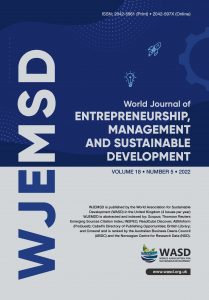Entrepreneurship development and financial literacy in Africa, Dr. Habib Abubakar
 Dr. Habib Auwal Abubakar
Dr. Habib Auwal Abubakar
African Development Bank, Tunis
Tunisia
Email: habibauwal@yahoo.com
DOI: 10.1108/WJEMSD-04-2015-0020
Purpose: The purpose of this paper is to analyse the level of financial literacy in Africa based on previous studies and evidence from financial literacy surveys, with the aim of establishing how financial literacy impacts entrepreneurship development in Africa. The study specifically looks at how financial literacy affects the household behaviour regarding financial decision making, as well as the gender gap in financial literacy. As financial literacy is gaining momentum both in developed economies with sophisticated financial systems and developing countries with low levels of financial services, this research seeks to establish a formal relationship between financial literacy and access to finance and what impact both have for developing an entrepreneurship society in Africa. It also focuses on the relationship between financial decision making and gender as well as access to finance with the aim of carefully examining the implications on entrepreneurship development.
Design/methodology/approach: To attain the above objective, the study employed a mixed methodology research design where both quantitative and qualitative methods were used. A survey method on financial literacy, conducted by: (Finscope, OECD) was thoroughly analysed in addition to previous work on entrepreneurship development, financial literacy, access to finance and poverty reduction in Africa.
Findings: The results show that the difficulties in access to finance, access to market, policy support and entrepreneurship culture are the main problems and constraints on entrepreneurship development in Africa which has a very strong implication for financial literacy on the continent particularly on micro, small and medium enterprises. Other important problems include unfavorable investment climate, absence of entrepreneurship training programmes, unfriendly investment business environment, gender gap and lack of value chain in the entrepreneurship ecosystem.
Research limitations/implications: The paper is limited to the established survey and mainly concentrates on Africa.
Practical implications: African governments and other development partners should re-evaluate their intervention programmes to strengthen financial literacy skills while simultaneously supporting entrepreneurship development by promoting an entrepreneurship culture through the right policy that will actively stimulate the development of entrepreneurs that will contribute to entrepreneurship ecosystems and ultimately enhance Africa’s economic development.
Originality/value: This paper aims at enhancing understanding of entrepreneurship development and financial literacy in Africa and will help policy makers and researcher fill the missing gap between financial literacy and entrepreneurship education. The recommendations made could significantly boost entrepreneurship activities as well as enhance financial literacy skills in the region, which can as well help increase access to finance on the continent.
Keywords: Finance; Entrepreneurship.
Citation: Abubakar, H.A. (2015), "Entrepreneurship development and financial literacy in Africa", World Journal of Entrepreneurship, Management and Sustainable Development, Vol. 11 No. 4, pp. 281-294. https://doi.org/10.1108/WJEMSD-04-2015-0020

